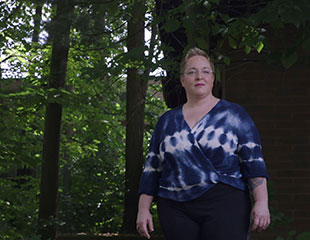Depression Is a Treatable Condition
4-minute read
Depression Is a Treatable Condition
4-minute read
People with depression often feel hopeless — that there is nothing they can do to feel better or improve their situation. But this hopelessness is a symptom of depression, not a reflection of reality.
In truth, there are many ways to treat and manage depression. That gives individuals a multitude of options for finding the therapies, medications, self-help strategies or combination of approaches that works best for each individual. The key is to start trying them.
Jennifer and Vernon are two Veterans who describe how they rediscovered hope.
Jennifer: Finding support and joy

Understanding and Overcoming Depression
“I spent a lot of time just by myself and in my room,” recounts Jennifer, a U.S. Army Veteran who experienced depression during her transition to civilian life. “I slept a lot. I didn’t want to go out. I didn’t take care of myself at all. I withdrew from everybody.”
“I didn’t find any joy in anything,” she adds. “I couldn’t see a future. I really didn’t ever see myself getting out of that hole.”
Jennifer says it may have been the birth of her nephew and her desire to be there for him that finally prompted her to seek counseling from VA. Through learning about and trying various options, Jennifer found the treatments and outlets that work best for her, including medication, talk therapy and CrossFit training, which serves as an outlet for her anger and a vehicle for clearing her mind.
Jennifer continues her talk therapy through video appointments, which give her more flexibility, and she says the sessions remain critical. “It works for me to talk and have somebody else point out the flaws in my thinking,” she says. The experience has also taught her that family and friends will respond positively when she asks for support.
“Don’t try to do it alone,” Jennifer advises. “Talk to someone.”
Vernon: From darkness to daylight
When mired in depression, Vernon shut himself off from the world. “I used to stay in my room and keep it as dark as possible,” the U.S. Army Veteran says. Even his stepdaughter’s entreaties to play with him could not draw him out.
Vernon’s downward spiral started when he rolled down a 25-foot cliff and suffered severe injuries in a training accident in Panama. The accident left him in a coma for 30 days and continued to haunt him long after.
“I kept reliving that incident of rolling down that cliff,” Vernon says. “I would be sleeping, and I’d wake up screaming.” He turned to painkillers, and then cocaine, in an attempt to find relief. Eventually, as a civilian, he landed in prison.
After his release from prison, Vernon experienced depression. “I felt like I was a monster,” he says. It was his stepdaughter’s look of despair that convinced him he needed to ask for help.
“All day long I would admit that I was an alcoholic and drug addict, but I refused to admit for a time that I had a mental health issue,” Vernon says. That changed when, through VA, he entered a residential rehabilitation treatment program that addressed both his substance misuse and depression.
Now he wakes up each day and opens the blinds. “Today, I welcome the day in,” he says. “I take my psych meds as prescribed, I do a little bit of [a] physical workout and I also do something spiritual. I’m very involved in my church and giving back to the community.” He also reestablished joyful relationships with his wife and stepdaughter.
“It takes a strong man to ask for help,” Vernon advises. “You’re not asking for a handout; you’re asking for a hand up. Find a counselor or contact your local VA and ask for help. That’s the only way it gets started.”
